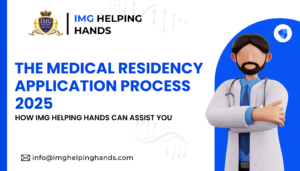
The Medical Residency Application Process 2025: How IMG Helping Hands Can Assist You
Have you ever wondered what it truly takes to secure your dream residency in an ever-evolving medical landscape? As we step into 2025, the residency
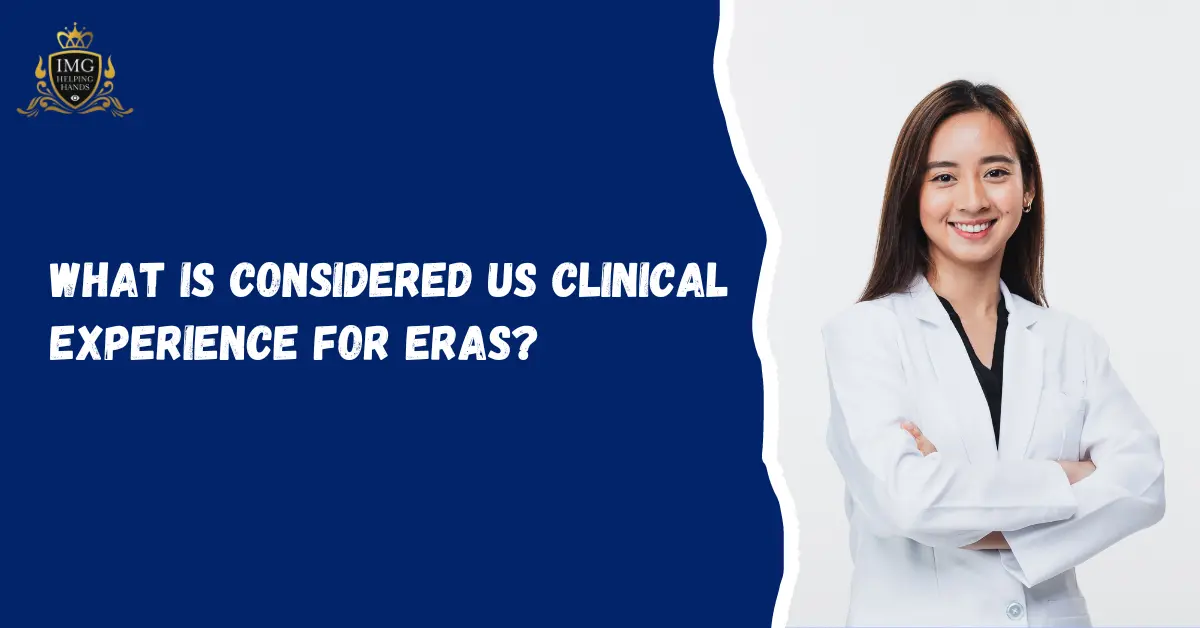
The Electronic Residency Application Service (ERAS) plays a pivotal role in the residency application process for all medical students and graduates pursuing graduate medical education in the US. ERAS provides a centralized platform for applicants to submit their credentials like transcripts, letters of recommendation, personal statements and more to residency programs they are interested in matching with. Having a strong ERAS application is integral for matching success, as it serves as the gateway for applicant consideration and interviews.
US clinical experience, commonly referred to as USCE, has become an increasingly essential element for IMG applicants to showcase in their ERAS applications. USCE provides tangible evidence of an applicant’s clinical skills, communication abilities, bedside manner, and ability to adapt to the fast-paced US healthcare environment.
In the competitive IMG matching process, USCE can help offset the potential bias of being a foreign graduate and level the playing field during applicant evaluations. Well-structured USCE in a variety of healthcare settings also demonstrates an applicant’s commitment to the specialty and determination to acquire the requisite clinical experiences in the US training model.
While having broad US clinical experience is important, for it to count favorably towards one’s ERAS application, it must meet certain specific requirements:
Clinical experiences meeting these parameters enable ERAS applicants to maximize the benefits of USCE towards their residency goals.
Let’s explore why US clinical experience matters so much for strengthening one’s ERAS application.
Data shows a direct correlation between the amount of USCE and successful match outcomes. In the 2022 Match, US MD seniors had a 93% match rate while IMGs had just a 53% match rate. The disparity in US training is one key driver.
A study found that IMGs who matched had an average of 27 weeks of USCE while those unmatched had 12 weeks. This demonstrates the competitiveness value derived from USCE.
Understanding the US clinical environment, practice culture and team dynamics is vital to success as a resident. Foreign-trained physicians may be unfamiliar with the technology-focused, fast-paced, collaborative nature of US healthcare delivery.
By completing US clinical rotations and externships, IMGs can showcase their ability to adapt to the nuances of the US system including aspects like:
– Comfort with advanced EMR systems and technologies
– Ability to effectively utilize interprofessional teams like nurses, pharmacists, social workers
– Familiarity with complex documentation, coding and regulatory requirements
– Patient-centered and participatory care philosophies
– Comfort working off service or outside direct specialty
Gaining this tangible exposure through USCE highlights an IMG’s preparedness for US graduate medical training and practice.
Success with USCE for ERAS also requires understanding the application process intricacies.
The ERAS application has sections for demographics, education, USMLE scores, publications, work experiences and crucially
The basic ERAS process includes:
1. Register on MyERAS and complete application portal
2. Designate desired programs and assign supporting documents
3. Programs review and may invite applicants for interviews
4. Interview at select programs if offered
5. Programs make match lists ranking applicants
6. Match results released and applicants find out placements
USCE information and documentation will need to be included from the initial application screening through final match decisions.
Each specialty has its own preferences regarding USCE focus that applicants should strategically align with:
Internal Medicine – Breadth of rotations in IM subspecialties like cardiology, gastroenterology, nephrology, etc.
General Surgery – Mix of surgery sub-specialties like colorectal, vascular, plastics, trauma, ICU, etc.
Emergency Medicine – High acuity rotations in trauma, toxicology, EMS, ultrasound, pediatrics EM.
Neurology – Neurology sub-specialty electives, also psychiatry and internal medicine rotations.
Obstetrics & Gynecology – Labor and delivery exposure, NICU rotations, gynecological oncology experience.
Psychiatry – Behavioral health, addiction medicine, crisis stabilization electives.
Researching specialty clinical experience requirements for ERAS and tailoring one’s rotations demonstrates sincere interest and commitment.
Two key factors impact the value derived from US clinical experiences for residency applications.
In general, more USCE correlates to a stronger ERAS candidacy but it is also vital to have depth in a few core experiences. Absorbing the lessons and knowledge from each rotation takes time. Rapidly rotating without gaining meaningful experience reduces USCE impact.
A prudent approach includes having:
– Core rotations in one’s specialty interest for continuity
– 1-2 month electives at select programs to build relationships
– Exposure to related subspecialties (e.g. NICU and OBGYN)
– Optional observerships at noted institutions if hands-on rotations are infeasible
Spreading USCE over time allows demonstrating long-term interest while month-long electives enable specific program exposure.
Strong letters of recommendation from US rotations drastically enhance ERAS credentials. US LORs need to highlight clinical skills, work ethic, patient rapport, communication abilities and medical knowledge.
Key considerations for productive US LORs:
– Build relationships early when rotating to secure letters later
– Obtain multiple LORs from attendings, program directors, department chairs
– Aim for personalized narratives of capabilities versus generic form letters
At least 3 supportive US LORs are vital for ERAS consideration but securing 5 or more advantageous based on competitiveness.
IMG applicants face obstacles in obtaining US clinical experience. Some ways to mitigate challenges are:
– Research visa needs for USCE early. Many use a B1/B2 visa which limits eligibility for clinical electives at US schools.
– J1 and F1 visas allow more flexibility but require careful management of days on each visa type.
– Work with agencies to extend or toggle between visa types and maximize USCE allowances.
– USCE, especially at top institutions, can be expensive for IMGs. Research all available external scholarships and medical societies offering assistance.
– Look for funded opportunities at teaching hospitals that cover housing or stipends.
– Save aggressively early in medical schooling to financially prepare for USCE. Pursuing clinical research or part-time work while rotating can offset costs.
– Rotating at community hospitals or rural health centers is more affordable but limits specialty exposure. Balance cost and value.
Gaining meaningful US clinical experience requires significant planning, effort and persistence. However, it is one of the most worthwhile investments an IMG can make towards achieving their dream of residency match in the United States. With passion and diligence, you have the ability to overcome any obstacles on the journey and succeed in the ERAS match process. Believe in your capabilities and take pride in your global perspectives. Your diverse experiences will enrich the US medical community.
Get our most valuable tips right inside your inbox, once per month!

Have you ever wondered what it truly takes to secure your dream residency in an ever-evolving medical landscape? As we step into 2025, the residency

For IMGs, to practice medicine in USA is more than just passing USMLE and securing a residency; it also involves surfing through the intimidating visa
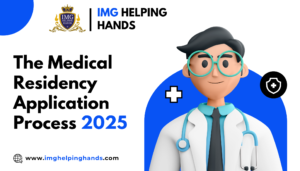
Are you ready to embark on one of the most transformative journeys in your medical career? The residency match process is a pivotal step for
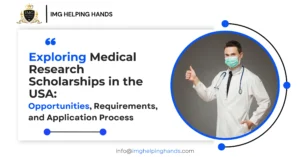
Pursuing medical research in the United States offers unparalleled opportunities for academic growth, access to cutting-edge technology, and the ability to work alongside leading experts
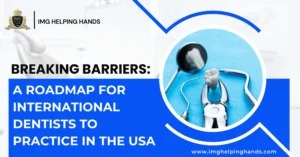
Embarking on a journey to practice dentistry in the United States is a dream for many international dentists. In the vast landscape of American dentistry,
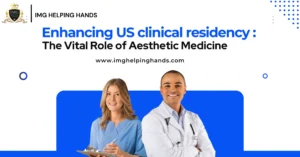
Have you ever considered the transformative power of aesthetics in the field of medicine? Is aesthetic medicine the silent cornerstone of modern clinical practice? Within
We are here to provide a safe and secure helping hand for medical students, graduates, and residents.
Our comprehensive guide will assist you in matching with your top-choice residency or fellowship program.




Payment Methods
Buy with Confidence
© IMG Helping Hands Copyrights 2024 Developed By Ecom Thrust